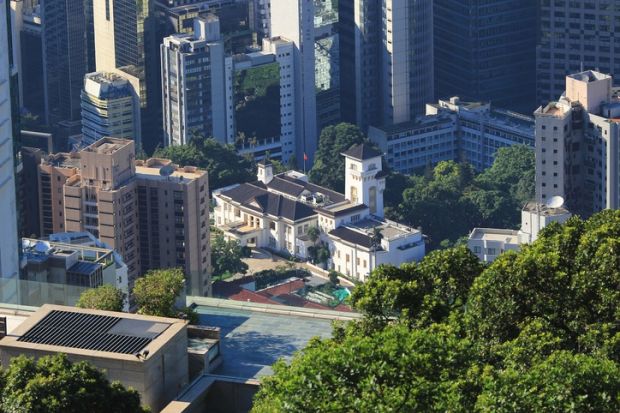Every six years or so, a dark, neocolonial cloud descends on universities in Hong Kong. That cloud is called the research assessment exercise.
It is named after – and modelled on – the precursor to the UK’s research excellence framework. And with the next iteration, in 2020, set to embrace the REF’s big innovation, the assessment of research impact, it is clear that Hong Kong’s University Grants Committee (another body named after and modelled on a British forerunner) remains committed to following where the UK leads.
As in the UK, Hong Kong researchers and administrators live in terror of what RAE results might do to them, their colleagues, their departments and their universities. They have already spent long hours preparing their submissions for UK-style “mock RAEs”, ahead of the 2020 exercise, aided by a small army of “impact experts” flown over from the UK – often from universities ranked much lower in global rankings.
This seems very odd. Hong Kong is the only former British colony using the RAE system. Its new political master, China, wouldn’t dream of adopting it – and China’s recent decision to fund research at labs in Hong Kong in an effort to boost cross-border collaboration is evidence of a desire for greater harmonisation between the two university systems.
Moreover, the relationship between the UK and Hong Kong regarding research assessment is entirely one-sided. All of Hong Kong’s units of assessment have UK academics as assessors and panel chairs; if the shoe were on the other foot and UK academics had to submit their work to panels overseen by Hong Kong and Chinese professors, I’m sure there would be a great deal of public debate.
Crucially, this peculiarly subservient regulatory relationship prevents Hong Kong academics from fully developing their understanding of their research’s relevance to their local community. UK academics do not have one eye – and in some cases two – on criteria and regulations forged overseas when they come to design and assess the impact of their own research on their local communities. Their connection with the regulations is more organic.
For those of us researching postcolonial theory, the irony of having our work assessed by a bureaucratic colonial transplant is clear. The very first page of the RAE 2020 guidelines directs readers to the equivalent document for the 2014 REF. This was published in 2012. Hong Kong academics, then, are living with guidelines that have long ago been revised for their peers in the UK. Why not at least refer to the guidance for REF 2021?
That would be all the more useful because that guidance contains significant developments dealing with diversity and equality. For example, it makes stipulations around “equality and diversity in the nominations process” for assessment panels and subpanels. This is important, the document reads, because the “UK higher education funding bodies recognise that diversity of perspective and experience contributes fundamental insight and value to the work of the REF panels”.
This is one instance where Hong Kong’s practice may well have something to learn from the UK. But the REF guidelines add that readers should look for further guidance on these matters to the UK’s 2010 Equality Act and to the UK government’s Equality and Human Rights Commission. In other words, the underlying philosophy of these developments in the REF regulations lies in legal and cultural values integral to UK society. Hong Kong, on the other hand, chooses to ignore the equality and diversity element in its transplanting of the UK framework because there is no Hong Kong Equality Act or Human Rights Commission.
This once again illustrates the problems with transplanting UK policy provisions. If Hong Kong built its own assessment regime from the ground up, as the UK has done, I contend that concerns about these important social aspects of how work is assessed would have been spotted and directly rectified.
Moreover, domestic, organic recognition of issues over equality and diversity could trickle down into the wider local community, influencing more general pushes in Hong Kong for advances in these areas. What better impact could the exercise demonstrate than that?
Michael O’Sullivan is an associate professor in the department of English at the Chinese University of Hong Kong.
后记
Print headline: Break the colonial mould




